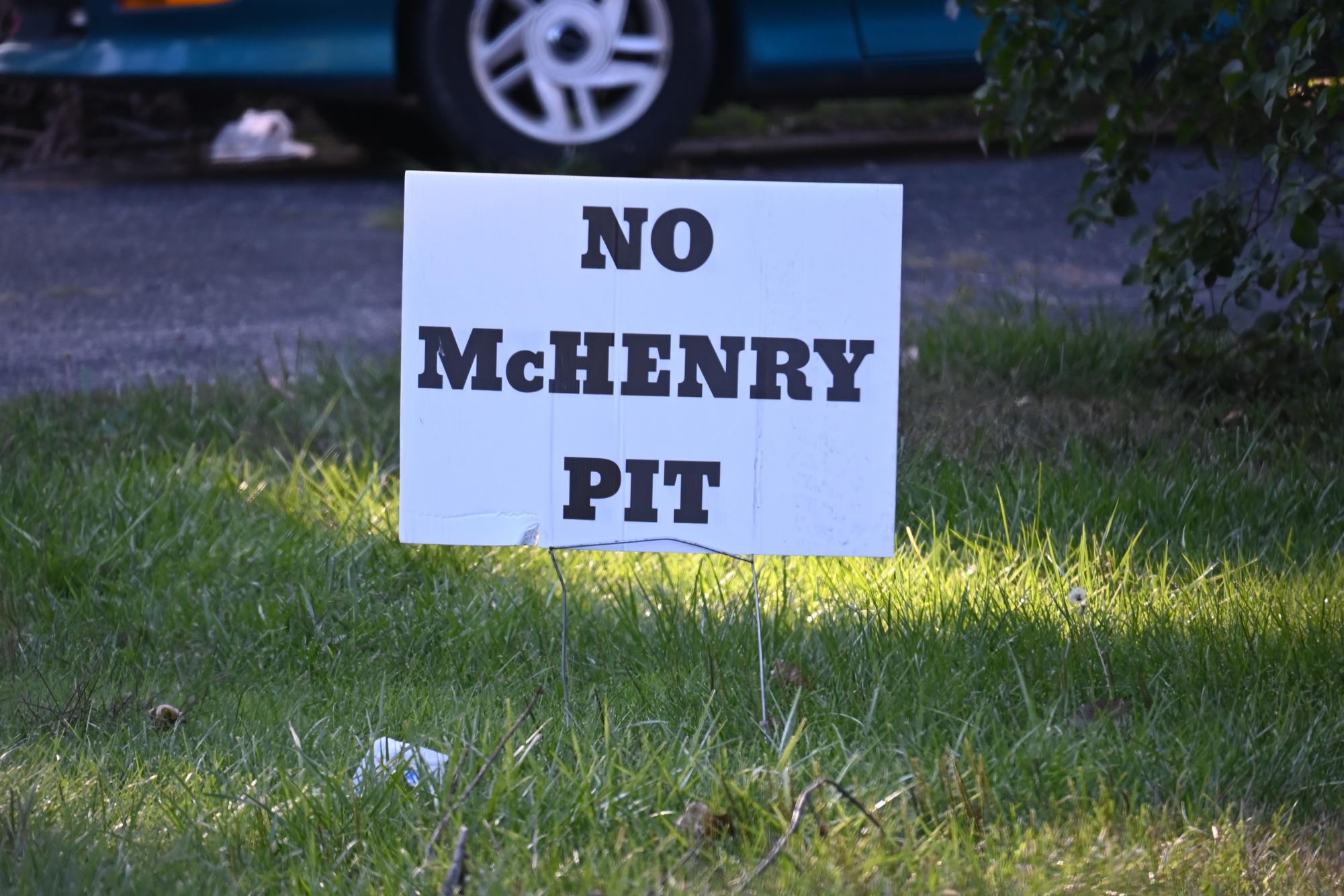A large open field next door to neighborhoods, schools and a local business might soon be the location of a massive gravel pit that some residents worry will be hazardous to their health.
This summer, yard signs popped up all over McHenry and its surrounding villages displaying “No McHenry Pit.” This pit has become a topic throughout the McHenry Community, with many city council meetings being subject to angered citizens arguing against it, but supporters of the pit’s construction argue that the concerns are unfounded.
The so-called “McHenry Pit” is a proposed gravel pit spearheaded by the gravel company Super Aggregates. It was first introduced in 2019, but only became a source of controversy this year when it hit the public spotlight.
The pit is planned to be built in a large empty field in the backlot of the McHenry Outdoor Theater off of Route 120 next to two residential areas and two schools. Its proximity to these areas is the key reason why it’s become such a controversial topic.
The “No McHenry Pit” movement began in Eastwood Manor, a neighborhood next to the proposed construction space, and lays out its key worries on its website.
The group’s number one concern is silica dust, a known carcinogen. No McHenry Pit claims, because of its proximity to a residential area and water wells, citizens should be worried. According to their website, other downsides include noise and traffic coming through the area, and home value possibly going down, making it difficult to sell a home in the nearby areas.
While those in favor of the pit argue it has its benefits, anti-pit supporters have been quick to dismiss them. No McHenry Pit’s website claims, “The projected tax revenue for the McHenry Gravel Pit is $1-2 million max … over 20 years.”
These worries have been expressed in public during city council meetings. However, because of its divisive nature, many anti-pit supporters have declined an interview. One resident declined an interview to “protect the identity of those involved,” and referred to city council meeting minutes instead.
Those in favor of the pit have been less vocal, but Jack Pease, president of Super Aggregates, adamantly vouches for his facility’s safety.
“A visit to similar facilities shows that there is no noise heard from the nearest home,” he said. “That visit also shows there is no dust to speak of.”
Pease also assured homeowners that the value of their property will change for the better.
“Market studies reveal a selling price increase of approximately 10% more than neighboring home sales thanks to the homes adjacent to our facilities enjoying a tranquil, natural, open space next door rather than more houses with noise and lights.”
Much of the public remains unconvinced, and along with them, local governments of both McHenry and Lakemoor are against it. Among those against the pit is McHenry Alderman Frank McClatchey and Mayor Wayne Jett.
McClatchey laid out his opinion on the matter flatly, citing location as being the main issue.
“All in all, the pit would just make McHenry look like crap,” he said, “and that’s not what we want McHenry to look like.”
For the most part, citizens who have aligned themselves with the No McHenry Pit movement are against the pit entirely. Anti-pit officials in town hall, however, share a more moderate opinion and seem open to the pit being moved to a new location.
McClatchey thinks that there are thousands of acres around McHenry County they could use for a gravel pit and building so close to neighborhoods and schools it seems unnecessary.
“As you know,” he adds, “this is a residential area … they would have to dig down at least thirty five feet to hit water, so thirty five feet of potential dust for years. Truck traffic is another issue. There are enough gravel trucks on 120, now.”
McClatchey is also well aware of much of the public’s stance on the pit. From passionate speakers in meetings to signs in front yards, it feels like nobody wants the pit at all, on the ground or in town hall.
“Nobody I know wanted the pit,” said McClatchey, describing the anti-pit to pro-pit ratio as “99 to 1.” There has been talk of petitions against it, however McClatchey commented that he doesn’t think the petitioner will go before the county board.
Despite the anti-pit sentiment, it continues to be a topic of discussion, and many people have been left with questions unanswered. McHenry’s city council is strongly opposed to the pit, as is Lakemoor. There are rumors of petitions and protest, but it continues to be only a possibility.
Mayor Jett, although first being open to an interview, didn’t respond to our questions.
Pease says that the next step for Super Aggregates is secure zoning approval from the county.
“It is a question of what is in the public’s best interest,” he says, “and of course the need of millions of people benefiting from new roads, parking lots, bridges, buildings, water plants, schools, etc.”
McClatchey thinks it will not get past the county board, saying, “With the city against it, Lakemoor against it, and now the township against it, it is going to have a tough time getting past the county board.”
Despite intense opposition, Pease intends to go forward with the plan. “Thankfully there is one company willing to meet the task of opening new facilities despite the efforts of our new online cancel culture,” he said, referring to his own company.
If the pit will be installed remains to be seen, but given the discourse, experts in public office say it’s unlikely. However, pro-pit supporters, despite being the minority, remain still in their opinion. The argument and public protest is not expected to let up any time soon.



